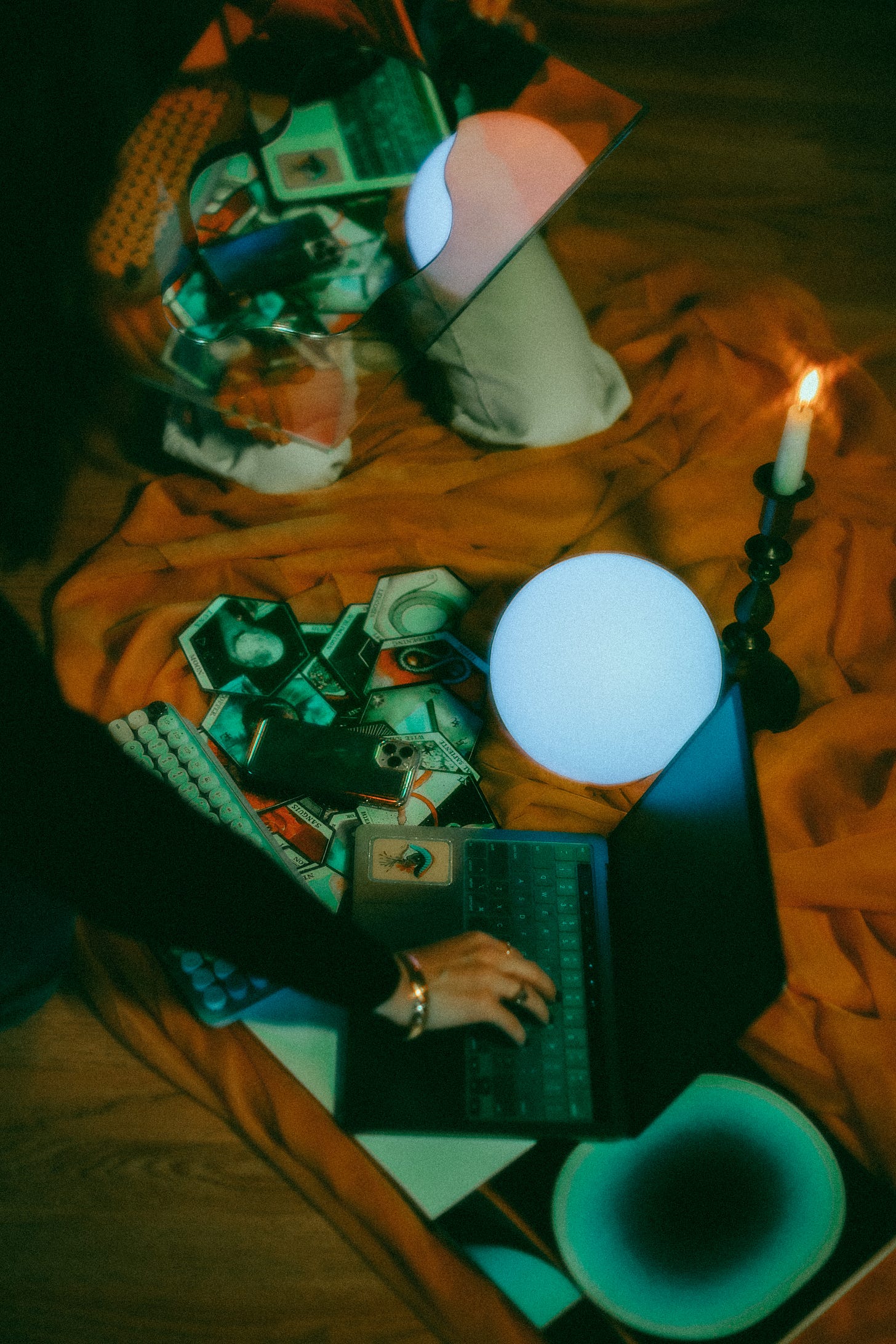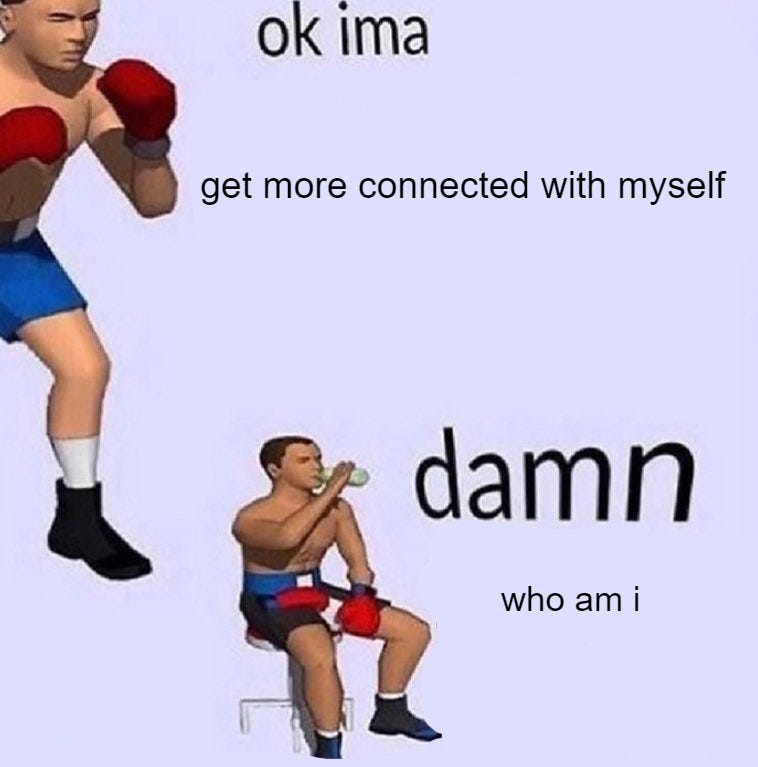“Is ruthfull a word,” I type into chatGPT.
This is peak AI usage for me — a digital Jiminy Cricket that spell-checks and validates my half-baked linguistic experiments.
“… like the opposite of ruthless.”1
I’ve been noodling on the concept of ruthlessness, and conversely, being full of ruth. The concept of being ruthless with one’s time, one’s mental space, one’s life force energy thrills me.
I desire to be ruthlessly clear in every way I possibly can be. Ruthless clarity sounds like touching God2, to me.
And when I look at being ruthlessly clear straight on, it’s hard to focus my eyes. I can’t exactly see how to do it. When this happens — when I feel like I’m staring at the sun trying to work out a problem — I find myself falling back on the mental model of via negativa. Via negativa is simple: sometimes it’s easier to define something by what it is not than by what it is.3
Its easier to define the ruthless clarity I’m going for by thinking about its opposite and avoiding that at all costs: Desire hoarding.
Desire hoarding is a potential-seer’s dream
Most of us accumulate unrealized possibilities and potential futures, storing them in our minds like precious objects we refuse to part with. This is "desire hoarding" — the compulsive gathering and preserving of all the things we might want to do someday, regardless of whether we'll actually pursue them. We become misers of our own imagined lives, guarding these possibilities as though they hold immense value simply by existing in our thoughts.
Desire hoarding is the Gollum-style collecting of half-baked dreams. Very "my precious" vibes for things you vaguely think you might want to do someday:
That screenplay you started after watching three episodes of Yellowjackets
The ceramics studio you'll start after taking one pottery class
Learning Spanish because you liked that one Bad Bunny song
It’s the collecting of potential futures. It’s fanfic you’re writing about yourself, which is an objectively helpful exercise (”romanticize your life” etc.)… but starts to get a teensy bit problematic when you lean too hard into the “fiction” part and never actually DO the stuff.
Desire hoarding is the refusal to pursue what you say you want because you’re in love with the potential of the desire itself. You don’t want to risk ruining it. But in doing so, you never get to find out what’s real.
Desires are doorways to a potential version of you that exists *somewhere* in time and space
In many ways, our desires act as an extension of our identity. Sartre said, We are our choices.
A desire represents a version of ourself we may hope to embody; a potential future choice that shapes our self-concept:
"If I want to write a novel, I must be the kind of person who has profound thoughts while staring pensively out of rainy café windows."
But what if you don't actually want to write the novel? You just want to want to write it?
Then you run the risk of learning that you’re not the person you imagined you could be. Despite the fact that you’ve now freed yourself from that desire — congrats! another thing off the to-do list! — you may feel like abandoning that potential option feels like erasing a version of yourself that you imagined could exist… somewhere… eventually.
The fear is that if we try and fail — or, erhmagod, even worse, if I try and don’t enjoy it — then who am I?
By not trying, you're already failing — but in a more convoluted and psychologically taxing way. When you avoid action, you're merely performing interest. It's an elaborate charade of false ambition without the courage of execution. And honeybaby, whomst are you performing for???4
So we pile up our desires (even the sort of tepid desires, the lukewarm desires, the barely-has-a-pulse desires) in our psychological storage unit, right next to that box of emotional baggage we've been meaning to unpack since 2018. Instead of putting these wants on trial by, I dunno, actually experimenting with them, we let them multiply and clutter up our mental and psychic bandwidth with "what-ifs" and "somedays."5
We don't act on ideas because untested fantasies are the emotional equivalent of unboxed collectibles — more valuable in their pristine, theoretical packaging. If we never test them, we never have to slam that door shut. And if that door stays perpetually ajar, we can maintain the comforting delusion that infinite possibilities remain eternally available, like a psychological all-you-can-eat buffet where nothing ever runs out.
But that endless scroll menu of potential futures isn't freedom — it's analysis paralysis dressed in a costume labeled "keeping my options open." You're basically standing in the hallway of existence, overthinking which doorknob to turn while actual LIFE is happening behind every single one.
We’d rather remain suspended in possibility purgatory than choose a door and discover what's real. Because executing on a desire puts it at risk. If we try something and it's underwhelming, we mourn not just the idea but the identity scaffolding we've constructed around it.
Desire hoarding as a psychic protection mechanism
So we hoard business concepts that would make even the most desperate Shark Tank contestant wince, half-written novels with protagonists suspiciously similar to ourselves, hobby equipment gathering dust like archaeological artifacts, personas we try on like fast fashion, dreams we clutch with white knuckles.
And then we have the audacity to be annoyed with ourselves for feeling overwhelmed! For lacking "ruthless clarity" about what to do next! As if our mental landscape isn't the psychological equivalent of that junk drawer everyone has but nobody talks about. With that much cognitive clutter, confusion isn't a bug — it's the entire operating system.
The antidote to desire hoarding isn't another self-help book or life hack or vision board or whatever Instagram is selling this week. It's experimentation. When you actually try something, you put it on trial with the universe as your jury, and verdict comes back embarrassingly fast: either "hell yes" or "dear god no."
What if we stopped treating every desire like a marriage proposal and started treating them like doorknobs? You touch them. You turn them. Some doors are locked. Some open to closets full of regrettable fashion choices. Some lead to rooms worth inhabiting. Some are fake doors you hallucinated during a pandemic-induced existential crisis.6
But unless you turn the doorknob, you'll never know which is which.
Liked this?
You’ll love Holisticism and our podcast The Twelfth House.
Want to learn more about intuitive business and creator-ship?
Sign up for the North Node waitlist here.
Into my persnickety personality and strategic perspective?
Inquire about 1:1 advising with me here.
heaven forbid I don't provide context, lest the algorithm think I'm just another internet peasant who can't spell "beautiful” or “business.”
in a good way, like a choir of angels singing kind-of-way, not in a Jacob getting his ass kicked in a wrestling match / Old T way
Via negativa is most commonly associated with apophatic theology, which is used to talk about the divine or the sacred — especially when it’s considered too vast, ineffable, or mysterious to be named directly. So instead of saying “God is love,” the via negativa might say, “God is not hate, not finite, not bound by time.” The idea is that you get closer to truth by peeling away falsehoods, illusions, assumptions, etc. It’s a very helpful model, can be used for deep and existential stuff like the divine but also is a sick way to politely describe something you dislike: “Wow, Nicole, this beaded throw pillow in the shape of your deceased cat you’ve made is not basic! It’s definitely not a typical throw pillow, and it certainly isn’t something that will just blend in to the couch that we’ll forget is even there.”
free yourself from the tyranny of self-surveillance! i beg!
to be clear, I’m actually a huge fan of adding your dream projects to your Project Board and actually filing them under the “SOMEDAY IN THE FUTURE” category vs. letting them drift out in the ambiguous potential future forever
A few years ago, I decided to get certified as a Financial Planner and Financial Therapist because it seemed like a Swiss Army knife of skills my clients needed. Personal finance isn’t my passion (is it anyone's??????), but I figured it would be a practical addition to my professional personality. Boy howdy did the training process frustrate me to tears. Ultimately, I learned that the juice wasn’t worth the squeeze for me. And while I may circle back to that potential future at some point, trying on the identity of Financial Therapist and seeing that it did not fit was a relief! A desire exorcism.











damn, i havent read an article as good as this in a long time
Woof, I feel so seen and called out! I've always called myself a digital hoarder... but now I know there's more to the picture! Thanks for this one—such a great reframe :)